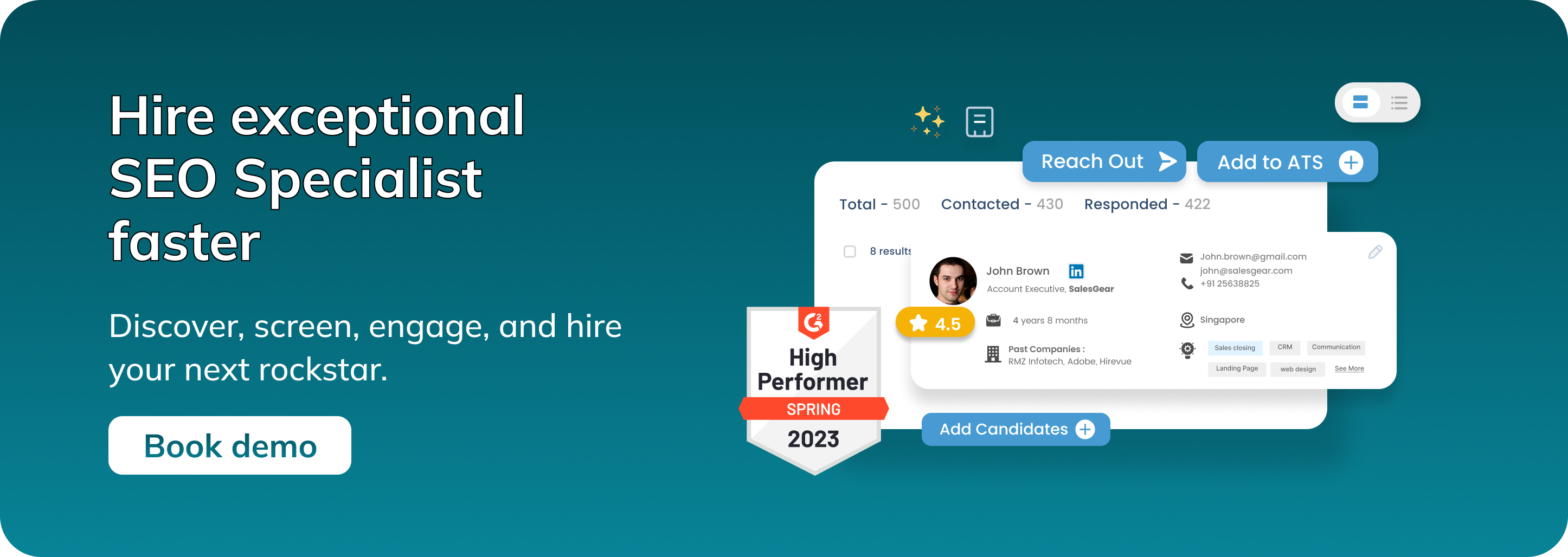SEO Specialist Interview Questions & Answers
Published on February 4th, 2024
Hiring the right SEO Specialist is crucial for driving organic growth and maximizing online visibility. Whether you're a seasoned hiring manager or navigating the recruitment process for the first time, it's essential to ask the right questions to assess a candidate's expertise and fit for the role. Below, we've compiled a comprehensive list of SEO Specialist interview questions and their corresponding answers tailored for fresher candidates.
Fresher SEO Specialist Interview Questions:
1. What is SEO, and why is it important for websites?
Answer: SEO stands for Search Engine Optimization, which involves optimizing websites to rank higher in search engine results pages (SERPs). It's crucial for increasing organic traffic, enhancing online visibility, and improving user experience.
2. Can you explain the difference between on-page and off-page SEO?
Answer: On-page SEO refers to optimizing elements within a website, such as content, meta tags, and URL structure, to improve search engine rankings. Off-page SEO involves external factors like backlinks, social signals, and online reputation management.
3. What are meta tags, and how do they impact SEO?
Answer: Meta tags are HTML elements that provide information about a webpage to search engines and website visitors. They include meta titles, meta descriptions, and meta keywords, which play a crucial role in improving click-through rates and search engine visibility.
4. How do you conduct keyword research for SEO purposes?
Answer: Keyword research involves identifying relevant search terms and phrases that users are likely to use when searching for specific topics or products. Tools like Google Keyword Planner, SEMrush, and Ahrefs help identify high-volume and low-competition keywords.
5. What are the best practices for optimizing website content for SEO?
Answer: Content optimization involves creating high-quality, relevant, and engaging content that addresses user intent and aligns with target keywords. It should be well-structured, include multimedia elements, and provide value to the audience.
6. How do you analyze website performance and SEO metrics?
Answer: Website performance analysis involves monitoring key metrics such as organic traffic, keyword rankings, bounce rates, and conversion rates. Tools like Google Analytics and Google Search Console provide valuable insights into website performance and user behavior.
7. What are backlinks, and why are they important for SEO?
Answer: Backlinks are incoming links from external websites that direct traffic to a webpage. They serve as a vote of confidence and authority, indicating to search engines that the linked page is valuable and relevant.
8. How do you stay updated with the latest SEO trends and algorithm updates?
Answer: Staying informed about SEO trends and algorithm changes is essential for maintaining effective SEO strategies. I regularly follow industry blogs, attend webinars, and participate in online forums to stay abreast of developments.
9. What are the common mistakes to avoid in SEO?
Answer: Common SEO mistakes include keyword stuffing, duplicate content, poor website structure, and neglecting mobile optimization. It's crucial to adhere to best practices and guidelines set by search engines to avoid penalties and ensure long-term success.
10. Can you discuss the importance of mobile optimization for SEO?
Answer: With the increasing prevalence of mobile devices, mobile optimization is critical for delivering seamless user experiences and improving search engine rankings. It involves responsive design, fast loading times, and mobile-friendly content.
11. What is the significance of site speed in SEO, and how can it be optimized?Answer: Site speed plays a crucial role in user experience and search engine rankings. Slow-loading websites often lead to higher bounce rates and lower conversions. Optimization techniques include minimizing server response times, leveraging browser caching, and optimizing image sizes.
12. How do you approach SEO for local businesses or businesses targeting specific geographic regions?
Answer: Local SEO involves optimizing websites and online profiles to appear prominently in local search results. Strategies include creating Google My Business listings, optimizing local keywords, obtaining local citations, and encouraging customer reviews.
13. Can you explain the concept of search engine indexing and crawling?
Answer: Search engine indexing involves the process of cataloging and storing web pages in search engine databases. Crawling is the automated process by which search engine bots discover and explore web pages by following links and analyzing content.
14. What are the key factors to consider when conducting competitor analysis for SEO?
Answer: Competitor analysis involves evaluating competitors' websites, content, keywords, and backlink profiles to identify strengths, weaknesses, and opportunities. Key factors include analyzing competitor rankings, identifying gaps in content, and assessing their link-building strategies.
15. How do you approach SEO strategy development and implementation for a new website or a website undergoing redesign?
Answer: SEO strategy development for new websites or website redesigns involves conducting thorough keyword research, optimizing site structure and navigation, creating high-quality content, implementing on-page and off-page SEO tactics, and monitoring performance metrics.
Mid level SEO Specialist interview questions
16. Can you describe your experience with developing and executing SEO strategies for mid-sized websites?
Answer: In my previous role, I was responsible for developing comprehensive SEO strategies tailored to mid-sized websites. This involved conducting extensive keyword research, optimizing on-page and off-page elements, and monitoring performance metrics to drive organic traffic and improve search engine rankings.
17. How do you approach technical SEO audits and identify areas for improvement?
Answer: Technical SEO audits are crucial for identifying and addressing website issues that may hinder search engine crawling and indexing. I utilize tools like Screaming Frog and Google Search Console to identify issues such as broken links, duplicate content, and crawl errors, and implement corrective measures accordingly.
18. Can you discuss your experience with conducting competitor analysis and leveraging insights to inform SEO strategies?
Answer: Competitor analysis involves evaluating competitors' SEO tactics, keyword targeting, and backlink profiles to identify areas of opportunity and gain a competitive advantage. I analyze competitors' keyword rankings, content strategies, and link-building efforts to refine our own SEO approach and enhance website visibility.
19. How do you approach content optimization for SEO purposes, and what strategies do you employ to ensure content resonates with target audiences?
Answer: Content optimization involves creating valuable, relevant, and engaging content that addresses user intent and aligns with target keywords. I conduct keyword research to identify relevant topics and incorporate targeted keywords naturally within the content. Additionally, I optimize meta tags, headings, and multimedia elements to enhance user experience and improve search engine visibility.
20. Can you discuss your experience with link-building strategies and acquiring high-quality backlinks?
Answer: Link-building is a critical aspect of SEO that involves acquiring high-quality backlinks from authoritative websites to improve domain authority and search engine rankings. I employ strategies such as guest blogging, influencer outreach, and content partnerships to earn relevant and authoritative backlinks within our niche.
21. How do you stay updated with the latest SEO trends, algorithm updates, and industry best practices?
Answer: Staying informed about evolving SEO trends and algorithm updates is essential for maintaining effective SEO strategies. I regularly attend industry conferences, participate in webinars, and follow reputable SEO blogs and forums to stay abreast of the latest developments and best practices.
22. Can you discuss your experience with conducting keyword research and optimizing website content based on keyword insights?
Answer: Keyword research involves identifying relevant search terms and phrases that align with user intent and business objectives. I utilize keyword research tools like SEMrush and Ahrefs to identify high-volume and low-competition keywords and optimize website content accordingly to improve search engine rankings and drive organic traffic.
23. How do you approach local SEO optimization for businesses targeting specific geographic regions?
Answer: Local SEO optimization involves optimizing websites and online profiles to rank prominently in local search results. I optimize Google My Business listings, incorporate local keywords and geo-specific tags, and obtain local citations to enhance visibility within target geographic regions and attract local customers.
24. Can you share your experience with analyzing SEO performance metrics and using data insights to inform strategic decisions?
Answer: Analyzing SEO performance metrics is essential for evaluating the effectiveness of SEO strategies and identifying areas for improvement. I regularly monitor metrics such as organic traffic, keyword rankings, bounce rates, and conversion rates, and use data insights to refine strategies, prioritize initiatives, and drive continuous improvement.
25. How do you approach website migration or redesign projects from an SEO perspective to minimize potential impact on search engine rankings?
Answer: Website migration or redesign projects require careful planning and execution to prevent disruptions to search engine rankings and organic traffic. I conduct thorough SEO audits before migration, implement 301 redirects for pages with changed URLs, and ensure proper handling of metadata, internal links, and XML sitemaps to preserve SEO equity and mitigate potential risks.
26. How do you approach on-page SEO optimization, and what are some key elements you prioritize?
Answer: On-page SEO optimization involves optimizing individual web pages to improve search engine rankings and organic traffic. Key elements I prioritize include optimizing meta titles and descriptions, incorporating target keywords naturally within content, optimizing heading tags, and ensuring mobile responsiveness and page speed optimization.
27. Can you discuss your experience with optimizing website architecture and internal linking structures for improved SEO performance?
Answer: Optimizing website architecture and internal linking structures is essential for enhancing crawlability, indexing, and user experience. I focus on creating a logical site structure, organizing content hierarchically, and implementing internal links strategically to distribute link equity and facilitate navigation for both users and search engine bots.
28. How do you approach optimizing for featured snippets and rich snippets to enhance search visibility and click-through rates?
Answer: Optimizing for featured snippets and rich snippets involves providing concise, relevant answers to common user queries and structuring content in a format that search engines can easily extract and display in search results. I identify opportunities for snippet optimization, create content that addresses user intent, and utilize schema markup to enhance content visibility and click-through rates.
29. Can you discuss your approach to mobile SEO optimization and ensuring websites are mobile-friendly and responsive?
Answer: Mobile SEO optimization involves ensuring websites are optimized for mobile devices and provide a seamless user experience across different screen sizes and resolutions. I prioritize responsive design, optimize page loading speed, and implement mobile-friendly navigation and touch elements to enhance usability and performance on mobile devices.
30. How do you approach SEO for e-commerce websites, and what strategies do you employ to improve product visibility and drive conversions?
Answer: SEO for e-commerce websites involves optimizing product pages, category pages, and navigation structures to improve search engine visibility and drive organic traffic and conversions. I focus on optimizing product titles, descriptions, and images, implementing structured data markup for product information, and optimizing internal linking and site architecture to enhance user experience and facilitate product discovery.
Senior level SEO Specialist interview questions
31. Can you discuss your experience with developing and executing comprehensive SEO strategies for large-scale websites or enterprises?
Answer: Developing and executing comprehensive SEO strategies for large-scale websites or enterprises requires a deep understanding of search engine algorithms, user intent, and competitive landscapes. I have experience in conducting thorough SEO audits, identifying opportunities and challenges, and implementing tailored strategies to improve search visibility, organic traffic, and conversions.
32. How do you stay updated with the latest SEO trends, algorithm updates, and industry developments, and how do you incorporate this knowledge into your SEO strategies?
Answer: Staying updated with the latest SEO trends, algorithm updates, and industry developments is essential for maintaining competitive advantage and driving sustainable results. I actively participate in industry forums, attend conferences, follow reputable SEO blogs and publications, and engage in continuous learning to stay informed about emerging trends and best practices. I incorporate this knowledge into my SEO strategies by adapting strategies and tactics to align with evolving search engine algorithms and user behaviors.
33. Can you discuss your experience with conducting in-depth keyword research and developing keyword targeting strategies to drive organic traffic and achieve business objectives?
Answer: Conducting in-depth keyword research involves identifying relevant search terms, analyzing search volume and competition, and understanding user intent to develop targeted keyword strategies. I have experience in utilizing keyword research tools, analyzing search trends and user behavior data, and developing keyword targeting strategies that align with business goals and objectives. I focus on identifying high-value keywords that drive qualified traffic and support conversion goals across different stages of the customer journey.
34. How do you approach technical SEO optimization, and what are some key technical aspects you prioritize for website optimization and performance improvement?
Answer: Technical SEO optimization involves optimizing website infrastructure, architecture, and performance to improve crawlability, indexation, and user experience. I prioritize key technical aspects such as site speed optimization, mobile responsiveness, crawl budget management, URL structure optimization, schema markup implementation, and XML sitemap optimization. I conduct comprehensive technical audits, identify and address technical issues and bottlenecks, and implement best practices to ensure websites are optimized for search engine visibility and performance.
35. Can you discuss your experience with link building strategies and tactics, and how do you approach building high-quality backlinks to improve domain authority and search rankings?
Answer: Link building is a critical component of SEO strategy aimed at improving domain authority, credibility, and search rankings. I have experience in developing and executing link building campaigns, prospecting for high-quality backlink opportunities, and leveraging outreach, content marketing, and relationship building tactics to earn authoritative backlinks from reputable websites and publications. I prioritize building natural, relevant, and diverse backlink profiles that adhere to search engine guidelines and contribute to long-term SEO success.
36. How do you approach SEO for international or multi-language websites, and what strategies do you employ to optimize content for global audiences and target markets?
Answer: SEO for international or multi-language websites requires careful consideration of language, cultural nuances, and search engine preferences in different regions. I focus on implementing hreflang tags for language and regional targeting, optimizing content for local keywords and search trends, and leveraging geo-targeting and international SEO best practices to improve visibility and relevance in target markets.
37. Can you discuss your experience with SEO analytics and reporting, and how do you measure and track key performance indicators (KPIs) to evaluate SEO performance and effectiveness?
Answer: SEO analytics and reporting involve monitoring and analyzing key metrics and KPIs to assess the impact of SEO efforts and identify opportunities for improvement. I utilize tools such as Google Analytics, Google Search Console, and third-party SEO platforms to track metrics such as organic traffic, keyword rankings, conversion rates, and user engagement. I create custom reports and dashboards to visualize data trends, measure ROI, and make data-driven decisions to optimize SEO strategies and tactics.
38. How do you approach SEO for content marketing initiatives, and what role does content optimization play in driving organic traffic and engagement?
Answer: SEO and content marketing are closely intertwined, with content optimization playing a crucial role in driving organic traffic, engagement, and conversions. I collaborate closely with content creators and marketers to develop SEO-driven content strategies, conduct keyword research to inform content topics and themes, and optimize content for search visibility and user relevance. I focus on creating high-quality, authoritative content that addresses user intent, provides value, and aligns with SEO best practices to enhance organic performance and achieve marketing objectives.
39. Can you discuss your experience with local SEO optimization, and how do you approach optimizing websites and business listings for local search visibility and customer engagement?
Answer: Local SEO optimization involves optimizing websites and online business listings to improve visibility in local search results and attract nearby customers. I focus on optimizing Google My Business profiles, local citations, and directory listings, implementing location-based keywords and schema markup, and soliciting positive reviews and testimonials from satisfied customers. I also prioritize maintaining consistency across NAP (name, address, phone number) information and optimizing landing pages for local intent to enhance local search visibility and drive foot traffic and conversions.
40. How do you stay organized and manage multiple SEO projects and initiatives simultaneously, and what tools or techniques do you use to streamline workflows and optimize productivity?
Answer: Managing multiple SEO projects requires effective organization, prioritization, and resource management. I utilize project management tools such as Asana or Trello to track tasks, deadlines, and project statuses, and communicate with team members and stakeholders. I also leverage automation and reporting tools to streamline workflows, monitor progress, and identify areas for improvement. By adopting agile methodologies and continuous optimization practices, I ensure projects are executed efficiently and deliver measurable results in alignment with business goals and objectives.
Authors

Pankaj Deshmukh
Pankaj Deshmukh is a digital marketing professional working with HireQuotient. He strongly believes in the never-ending process of learning and stays updated with the latest trends in order to produce valuable content.

Hire the best without stress
Ask us how
Never Miss The Updates
We cover all recruitment, talent analytics, L&D, DEI, pre-employment, candidate screening, and hiring tools. Join our force & subscribe now!
Stay On Top Of Everything In HR


